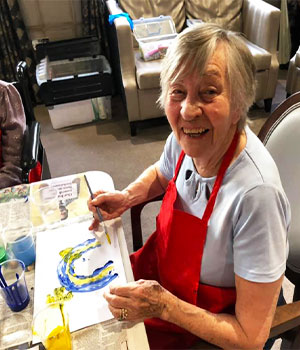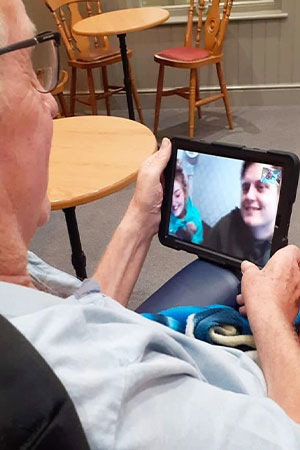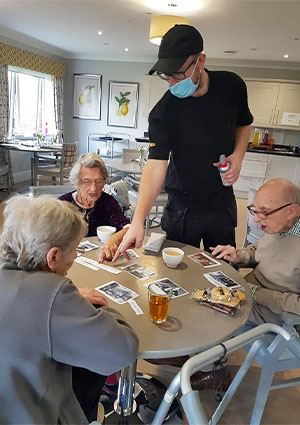Moving into a care home can be daunting at any time but the current COVID-19 pandemic makes big decisions about the care of a loved one even more difficult. Worries about not being able to visit family members or concerns about them being lonely are common. Our article will guide you through how to choose a care home, what the process of moving in will be and what to expect when you get there.
There is a lot of information and advice online about care homes and sometimes the sheer volume of information can be a little overwhelming. Starting with an independent source of care home information such as carehome.co.uk will give you an unbiased view of care homes in your local area, coupled with reviews from residents and their families. You can also find out about homes via other websites such as NHS Choices, Age UK and even reviews on Google or Facebook.
It can be helpful to look through the latest CQC reports for the homes you are interested in. On the CQC website (www.cqc.org.uk) it is possible to enter your postcode and search all categories of appropriate care homes within a nominated mileage range. Inspection reports are available for care homes of all categories and will give you an indication of the suitability for the person who may need care. It is a good idea to ask the manager of the home further questions about their report if you have any concerns or need clarification.


Many people find out about the best homes in the area by word of mouth, this can be an invaluable way of understanding what a Care Home is like. Ask around your friends and family if they have a recommendation and there are several people in a professional capacity who would be able to help, such as GPs, hospital discharge teams, Occupational Therapists and even people like community workers or members of the local Church.
Once you’ve made your initial shortlist, phoning the home you are interested in is the best way to get a feel for things. Ask for the Home Manager or Customer Relations Advisor who are the best people talk through any questions, concerns or worries that you have. They will be more than happy to chat with you about your care needs and get to understand what you are looking for. It can be stressful looking for a care home and knowing what you want, so make sure you take your time to discuss what is important and don’t be afraid to ask anything you need.
Usually the Manager would invite you in to take a look around the home, to meet the staff and residents and see al the facilities. This may not be possible during Covid, so instead they will offer a live walk-through tour using mobile technology such as ‘Facetime’ or an online video call. You can use this, just as you would a face-to-face meeting at the home, as an opportunity to speak to people who live and work there and view everything that would be available if you or a loved one was living there. It is good to ask about what life is usually like in the Care Home, as well as how they have handled things during the Covid-19 pandemic, to help put your mind at ease.
Once you have decided which home is for you, an assessment will need to be arranged to check whether the home you can accommodate the care needs of the person. Usually this happens face-to-face, in a place that is suitable for you as a family. At the current time assessments are mainly carried out over the telephone or via a video call rather than face-to-face. If the person moving to a care home is in hospital, then the discharge team or ward staff will help to complete the assessment of their health and care needs. Where the person may have communication needs or reduced mental capacity a trusted assessor, a family member or advocate will be able to help the person complete the assessment over the phone. If a new resident is coming from their home their family will need to arrange for their GP to fill in a questionnaire about their care needs. The Home Manager will talk you through the assessment process to help make it a smooth process for you and your loved one.
All new residents coming into a Country Court Care Home will need to be tested for COVID-19, the result will need to be negative to ensure that the virus is not bought into the care home. If it is an emergency and a resident cannot be tested for Covid-19 before coming into the home, they will need to isolate in their room on arrival. They will be cared for by dedicated staff, while they wait for a Covid-19 test, which will usually be able to take place within the first 48 hours.

There may be other occasions where new residents coming into the home need to isolate, for safe infection control, which the Home Manager will discuss with you if required. Although isolating new residents is not how care homes would want to welcome new residents, your loved one will not be alone. They will be visited in their room regularly by staff, including carers and housekeepers who will take the time to get to know them and chat for as long as they want to. They will be able to take their meals in their room and hot and cold drinks and snacks will be available all day. Families will be able to speak to their loved ones over the phone or via video calls.
At Country Court, the majority of our homes have been Covid-19 free during the pandemic and our infection rates are well below the national average. Where we have had cases, these have been well managed and most people have recovered to be safe and well. All Country Court Care Homes residents are tested for COVID-19 on a regular cycle (7 to 14 days) and are monitored daily for symptoms of the virus. This ensures that any new cases of the virus are identified quickly, and action can be taken to care for that person in isolation, to keep themselves and other residents safe.
The biggest difference that most residents notice is that all staff are wearing personal protective equipment (PPE). The wearing of facemasks in mandatory unless staff have a specific reason for not wearing one, in which case they will have a visor. Although this can be difficult for residents and can sometimes make communication difficult, most people understand that it is for their own safety and have quickly got used to the change.
Country Court Care Homes have always followed rigorous infection control procedures, as we know how important it is to prevent an outbreak of any virus. These have been intensified during the Covid-19 pandemic, with increased cleaning routines across all of our homes. For more information on this, please see our Commitment to Safety Document.
As far as possible life for residents is kept as ‘normal’ as possible within their homes, daily routines and schedules are followed as much as possible. This is especially reassuring for those living with dementia who find a routine helpful and calming.
Most care home activities are able to continue, with residents able to enjoy their usual hobbies and pastimes such as arts and crafts groups, music and singing, baking and seasonal activities. Trips out have not been possible during the pandemic, but many care homes have gardens and outdoor spaces that residents can enjoy. Gardening competitions during the summer months, such as Country Court in Bloom, helped to encourage people outdoors with lots of activities and gardening tasks to enjoy.
In lieu of day trips residents have had fun enjoying ‘virtual’ days out with theme days ranging from seaside days to Jamaican days with authentic food and music. Themed days are a great tool for reminiscing about holidays and people’s birth countries and have facilitated lots of lively discussion and memories.
People are encouraged to keep active with a creative range of exercise programs from chair-based yoga to dancing and garden games. Residents in Country Court care homes recently enjoyed a week of Olympic themed activities with activity training partner Oomph Wellbeing. The Oomph-lympics included team rowing, Boccia, bop-fit, badminton, table tennis and event artistic swimming competitions.


The extent of visiting will depend on the restrictions in your local area so please check with your individual care home who will have their own visiting plan. Country Court Care Homes will allow visits where possible as it is important for family members to see their loved ones, which will be a decision made on how safe it is for these to take place.
When you can visit you will need to book the visit in advance, it is likely to be restricted to 30 minutes with one or two guests at a time. During the visit, you will need to wear full PPE, adhere to social distancing and be restricted to a designated area of the home. An example of visiting guidelines can be seen here, but do check with your individual care home.
Staff are on hand to facilitate video calls and each Country Court Care Home is supplied with tablets to ensure people can chat with their loved ones. Calls need to be booked in advance and users will need a Gmail account and the Google Hangouts App. There is a handy guide to video calls here.
Being unable to visit a loved one is very frustrating and can be upsetting for families, which can be the same in and outside of a care home, with the current restrictions However, if your relative lives at Country Court, you can help, even from a distance. By providing the staff team with as much information about your loved one as you can ensures that they are aware of their hobbies, interests, likes and dislikes. This will enable staff to help them to settle into their new home and make sure they spend time doing things they love every day.
Little things can make all the difference, so having their preferred chocolate bar, their favourite music or making sure they get to see their chosen TV show will help them feel at home. Bringing personal items that are important to them such as photo albums, pictures and ornaments for their bedroom will also help people settle in. Receiving letters and postcards from family and friends, or pictures from grandchildren is a great way to help people stay connected with their families and loved ones. A card, note or photo that they can look over again helps people feel reassured.

Many care homes have their own Facebook pages where you’ll be able to see some of the activities, food and interactions that take place in care homes every day. Many people find it reassuring to know that their loved one is busy and engaging with other residents and doing activities that they enjoy and are meaningful to them.
If you are concerned about how a relative is coping at home and would like them to have more support, please get in touch with our care and nursing homes near you. We are happy to discuss your care needs and answer any questions you may have.